Mark sees through a glass, darkly.
By Mark Fenton
Published April 30, 2007
Whenever I try to type 'Mark Renton' into a Microsoft Word file, the software 'corrects' it to 'Mark Fenton', believing it is helpfully fixing a misspelling of my own name. My computer acts as though it's smarter than me, which, by being so blatantly and aggressively dumb, makes me feel superior.
These days I'm using more tools than ever in my life and love to celebrate any advantage I have over a machine.
If I my thoughts have been returning to Trainspotting's Mark Renton, everyone's favourite Glaswegian heroin addict, it is not just because he is my linguistic near-double. It is for the scene in the film version, entitled The Worst Toilet in Scotland.
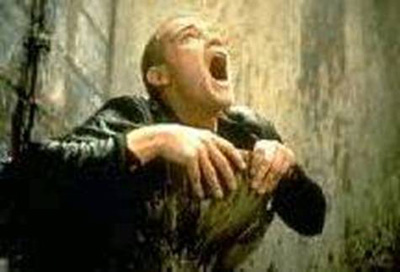
Ewan McGregor as Mark Renton in Trainspotting
While I'll agree that this restroom needs a good mopping down, in comparison to my own it's fairly workable.
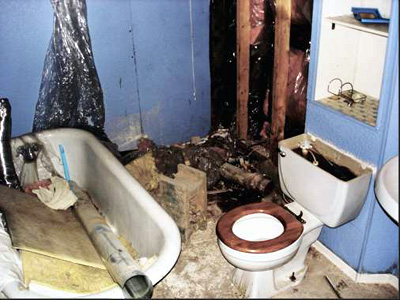
In fact, given some recent experiences with weak toilets I almost envy a flush so powerful as to engulph an adult human. No junky would be ambitious enough to get past the rubble blocking my washroom in order to cop drugs or have an "in-toilet hallucination." He'd simply move on to the washroom of the Esso down the street.
"What hideous depravity do you get up to, Mr. Fenton, that your washroom looks like this?" you ask.
BACKSTORY:
My family and I, with the help of people who own larger tools and have a broader handy-person skill set, have been renovating a house we are on the verge of moving into. Foolishly we are trying to do all of it at once, (pretty much the first rule in any book of home-reno on how NOT to proceed.) I'm sure it will be beautiful when it's done. At the moment it is in ruins.
I should add the washroom you see here is one of two, but at the moment the only one with running water, hence the one we need to use. It is tucked at the back of a dark basement through which it's hard to navigate with the construction and stuff we've been moving in. Leave yourself ample time.
There are times when the prospect of a day at the office is more appealing than problem-solving in the domestic theatre. The day I took the above photo of our bathroom was one of them
. I work in the aviation industry. On arriving at work, my Outlook task pane reminded me of the two primary tasks that awaited me, which I will amplify here for those unacquainted with the challenge of moving large jets hither and thither.Task One: make hotel reservations at Resort X for flight crew and engineers in DR.
I'll leave the location of Resort X as vague as 'somewhere in the Dominican Republic.' With the airline I work for, all trips are tentative until the aircraft is actually separated from the ground. In other words, any arrangements I make will potentially need to be cancelled at a moment's notice.
I've dealt with Resort X before. I have Google-mapped the area. I have sent people there to report back, and all reports agree it is the single resort in a resort town very far from any other town or resort. Resort X demands all payment up front by credit card, which will be charged immediately with no possibility of changing dates and no refund for cancellation.
While I don't have a lot of experience with the cadences of Spanish inflected English in DR, and may be misrepresenting the reservation clerks I've spoken too, I can't help feeling there's a certain glee in their voices as they remind me of this. I consider replying that if there is no refund for cancellation there's NO INCENTIVE to inform them of cancellation, and that, really, their use of the word 'cancellation' is nonsensical, given their premise that cancellation doesn't exist at Resort X.
However, rather than come across as a uppity Wittgenstein enthusiast, I try to emulate their tone of casual good humour. My Spanish consists of "buenos dias," "si," "por favor," and "yo la tengo" whose meaning I only know because of the ass-kicking North Jersey indie band of the same name (whose three albums I Can Hear The Heart Beating As One

And Then Nothing Turned Itself Inside Out,

and Summer Sun
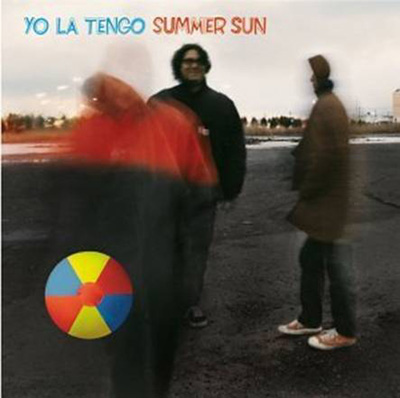
I call nearly flawless, and often play on the CD drive my office computer as I speak to people in such places as DR). I manage to use all of these expressions at some point during the conversation. No luck. These are the rules and they will not change.
I will have to pay in the neighbourhood of $7,000 USD up front, and implied in that is "and we can double it at any time, just because we can." Such is the nature of a monopoly.
Hanging up I try to conceive a way in which, should my plans be changed and the rooms wasted, I can get the confirmation numbers of these prepaid rooms to some local Dominican homeless people (of which I've heard there is no shortage) and instruct them to live it up in Resort X for three days.
Task Two: Call Airport Y on the French Riviera and inquire about the possibility of parking a 100 foot jet there for a two week period which overlaps both the most popular auto race and the most popular film festival in the region.
Again, I have been down this road before and will be again. I speak considerably more French than Spanish, but I never even try with the operations manager, who speaks perfect English, and who will inform me that if, and only if, absolutely NONE of his VALUED customers, or even moderately FREQUENT customers chose to arrive during this interval, he MIGHT consider allowing us to park (for more Thousands of Francs a day than I even want to think of) but that he won't know until a few days before we arrive.
No, he will not call back to inform me if there is space. I will have to keep his consideration alive by calling at regular intervals. I feel there is something in his tone that suggests I should be very thankful for such generosity, but I could be imagining this.
Neither of these problems appeals to me. I don't want to think about home renovation, but I figure I can just about handle thinking about moving stuff from one house to the other. It's then that I remember a series of strong plastic bins we had no room for at home.
The top floor of our hangar is still under construction and has been for over a year. It will be configured into offices I'm told, someday, but not any time soon. As no one was currently using the space for anything, I had decided some months ago to store these bins on this floor. I hid them behind boxes,
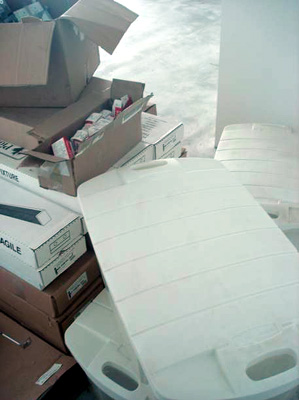
Yes, they would be perfect for moving.
I walked upstairs to get them.
I had forgotten that the roof of our building had sprung horrible leaks from the weight of ice on it this winter. Storage guerrillas, be warned by me: If you make use of other people's space to house your vessels, during times of flooding, your vessels will be appropriated.
And so had mine been.
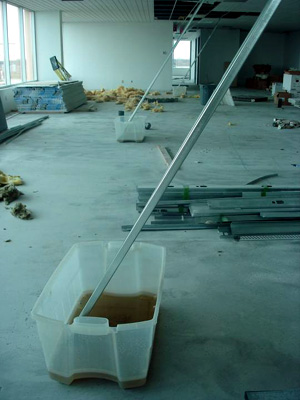
Each with a narrow metal trough at the same angle as though they were the trappings of a horrifying ritual, ejaculating into each bin an unspeakable sludge.
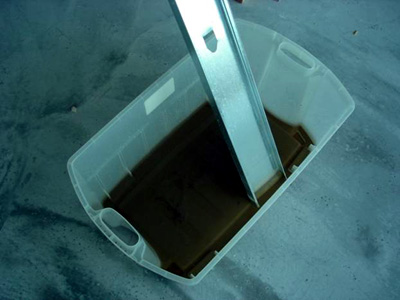
It looked toxic. Even the my brief recognition that the angle of these bars echoed the stark stunning diagonal of Anthony Caro's Eyelit was cold comfort.
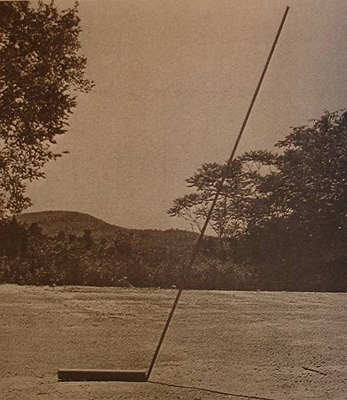
Anthony Caro, Eyelit, 1965 (welded steel painted a vibrant deep blue)
I had had enough of everything at this point. I needed to be alone. I got in my little car and drove to a residential street as close to the intersection of Stonechurch and Garth as I could get (not very close) and as I parked, walked, and started photographing random signs,
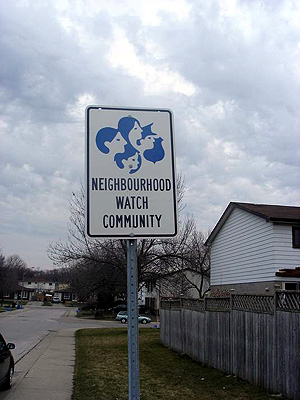
I could sense motorists slowing, and reaching for cell phones.
I sought a spare landscape of primal forms and I found it.

I was, I realized, AWOL from both home responsibilities and work responsibilities. Didn't much care. 'Perhaps' I said to myself, maybe even out loud, 'perhaps you've finally snapped, Mark...Fenton?...or is it...Renton?' Buy I was considering the proposition as I would consider it of a character in a novel, for that matter a novel that hadn't yet managed to fully engage me.
I found what I have driven by for years, and longed to get out and walk around. It is worth a slow approach from several angles.
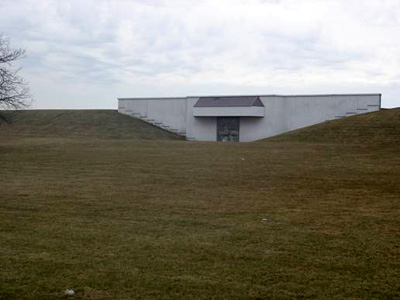
It is so spare and weightless, despite being embedded in snug, nurturing earth
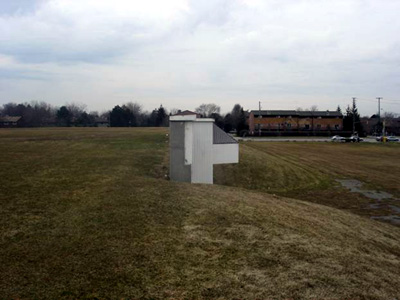
And it all but disappears when you approach it from the side, such that one imagines an origami master could contrive an exact scale model, embedded in moss, perhaps complimented by the expert placement of a single bonsai.
It is a good height to be leaned upon.
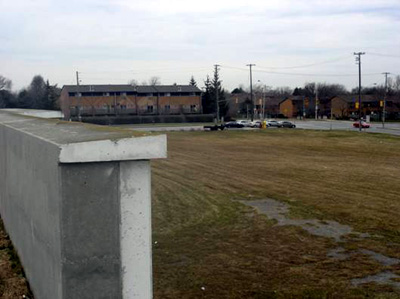
And at last, I realized, I had discovered a living example of that wall that had intrigued me so often as a child. The wall that the characters of Peanuts use to support not only their upper bodies, but the largest of unanswerable questions and unshakable burdens. Sometimes it is the set of an entire four-frame sequence; sometimes only for the final frame.

Click on the image to see a larger version
I used to watch the Peanuts TV specials as a child, seeking some answer to the architectural purpose of the wall. But moving pictures simply amplified the mystery. Linus and Charlie Brown would be walking, the frames simulating a movie camera tracking parallel to its actors, and the wall would enter the shot. Linus and Charlie Brown would stop at the spot they always stopped at, without even having to communicate why and where, and lean, and ruminate.
Thus the wall was elemental and sacred, like the single stage prop from a French drama of the 50s. (As always, readers, if you have knowledge of a Peanuts episode I somehow missed, which explains the wall, please comment and explicate.)
It also strikes me that with a stop at a gardening centre, the westernmost edifice at Stonechurch and Garth could easily become the set of the Teletubbies, if the tots are getting bored and the producers feel a need to breathe new life into the series.

Image Credit: Transsexual.org [sic!]
As you can see this image is borrowed from a website devoted to gender confusion amount Teletubbies, a subject from some brief surfing, seems to hold a baffling fascination to people who have far more disposable computer time than I do.
In the early days of the show I used to enjoy it with my daughters and never even thought to remark on the obvious pansexuality of the insipid quartet, not that my children, being pre-lingual, would have then understood my comments.
While I personally have made only the mildest flirtations with cross-dressing (usually in conjunction with a corporate marketing presentation for the Christmas promotion) I have never had an issue with it either in my close personal friends or in children's entertainers.
I feel I'm belabouring this. I just want to be clear: I borrowed the image from this website as it was the only good establishing shot of the Hill Home exterior I could find, NOT because I was supportive of a prurient webmaster all in a tizzie over gender shenanigans.
As I stood at the wall was struck by the building to which it seemed liked a pointer

linking forms of near Druidic geometric perfection; urging a future generation to decode its architectural language; to possess its magic
.Hexagonal. The road to it insinuating itself into it like a serpent and sliding under it's blind boarded entry.

A lone tree gestured like a finger of warning. The round object on the roof was what struck me....It reminded me of...of...

a planetarium....? No. Then it hit me. The camera obscura in Santa Monica, immortalized in the October 13 1947 episode of Quiet, Please.
In case you haven't heard of it, Quiet, Please, written by Wyllis Cooper, is a radio drama which ran from 1947-1949. The show is striking for its minimal forces. Flashbacks framed by a desperate yet strangely understated real-time intro and conclusion by the first person narrator. Even the flashback is largely exposition, with small bits of two person dialogue, covered again with its single lead actor/speaker, Ernest Chappell.
Each show introduces a new set of characters and situations, which even lack even a consistency of genre, although most episodes fall into the categories of Noir crime, science fiction, and fantasy. Short declarative statements of information so mundane it has to contain sinister foreshadowing are typical:
Not everybody knows what a camera obscura is.
But practically everybody here in Santa Monica knows.
There is a stillness, resignation, a post-war malaise to Quiet, Please. The voice is defeated, jaded, and very, very tired. I know no other radio show that seems always on the verge of falling into dead air, radio static stranding the listener in a void of lost connections. (For me there is an ideal listener to Quiet, Please
.It is Monday October 13, 1947. There is a man who lives in an anonymous mid-sized city in the Midwest. Everyday he puts on a suit and goes to a job in an office. It's nothing special, his job. But he works hard and hopes for a promotion. Maybe someday he'll have a family, but right now he lives alone.
It is twilight when he gets done work. The leaves on the trees are turning. On his way home he stops at the diner for a bowl of soup. He looks at his watch. He gives the waitress a big tip and she gives him a big smile. He goes into his apartment which is above a hardware store. He turns on the radio, pours himself a neat Bourbon, and sits in the room's only chair.
Quiet, Please is just starting. The man listens, and dusk turns to dark. And when it ends he walks over to the standing lamp and turns it on and turns the radio off.)
The show's first person voice has to carry the weight of defining character, as well as evoking complex physical objects, and a specific layout of locations. Cooper is masterful, and redolent of his period too:
Biggest camera obscura in the world's right here down at the foot of Santa Monica Boulevard in the little park that runs along the top of Palisades.
It's a little green building, probably twenty feet high, practically circular.
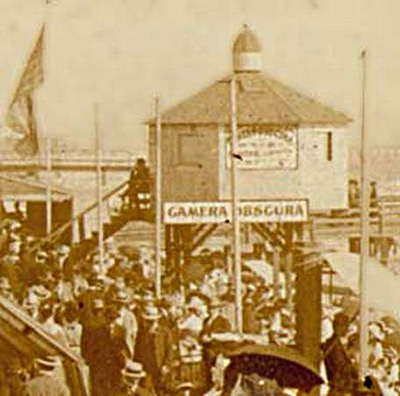
Image Credit: Brightbytes
Maybe twenty feet in diameter.
Up in the top, in a little kind of cupola, is a lens. Like a camera lens, only bigger. There's some kind of mirror arrangement in there with it and there's a big round table
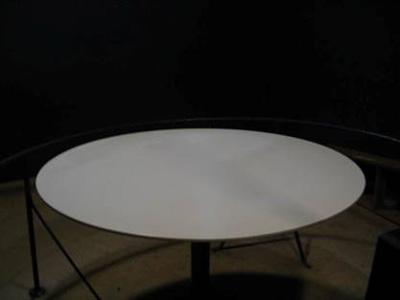
Camera Obscura, Palisades Park Senior Recreation Center, 1450 Ocean Avenue, Santa Monica, California (Image Credit: Bridge and Tunnel Club
that almost fills the building - white top on it - and the image the lens picks up is reflected down on to the table so it's, uh, like a Technicolor movie of whatever's goin' on outside.
In a tone of if-any-good-can-come-out-of-what-I've-done-it's-telling-you-so-that-you-don't-make-the-same-mistake-I-did Cy tells his story. He gets talking to a waitress in the coffee shop. Cy can't remember her name, which adds a strange "obscure nature of identity" quality to what is already a nightmarish tone. Did it happen a long time ago? Or is the name confusion indicative of a drama that has always happened and always will, with only the names changing? He keeps calling her "Mary or Kate or something" She's all upset. Turns out that she borrowed money to give to her fiancé Phil, and now Phil has disappeared. Yep, Phil is dead. Who do you think murdered him? Cy did.
Again, in what feels like an inevitable but not really rational progression of events Cy and "Kate or Mary or whatever her name is" start hanging out together and when they're really hard up for entertainment Cy suggests going to the Camera Obscura. I won't give the entire story away, but they see things that aren't there. In fact...they see Phil! And slowly on repeated visits, Phil starts to reveal...
As I say, it's better to listen to it. It's public domain and downloadable
:I was thinking of this episode when I got back to the office and decided to surf more deeply into the Santa Monica Camera Obscura. I came up with this, much more recent image (to judge from the vehicles) on the table. It seems sadly predictable that all you can really see now is traffic congestion.
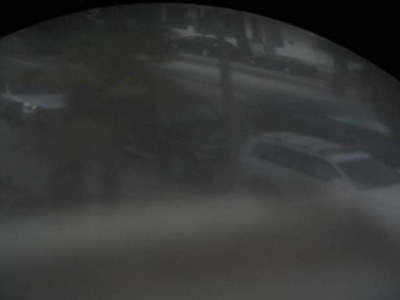
Camera Obscura, Palisades Park Senior Recreation Center, 1450 Ocean Avenue, Santa Monica, California (Image Credit: The Bridge and Tunnel Club)
It made sense that these images would summon up the conscience of the murderer. The blurred gunmetal ghosts of images punctuating the black struck me as similar to a web page I'd recently discovered, reproducing Gerhard Richter's Baader-Meinhof sequence.
This series of paintings, emulating the surface of dark, out of focus, black-and-white photographs, documents the career and demise of the Red Army Faction (AKA Baader-Meinhof after the names of two of its founding members), the German terrorists from the 1970s whose simultaneous suicides in separate jail cells have never been fully explained.
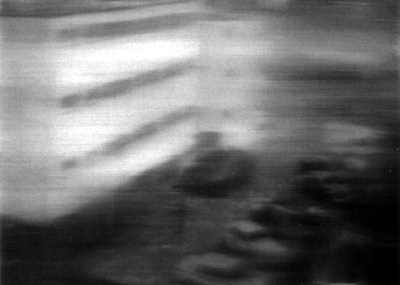
Gerhard Richter: Arrest 1 (Festnahme 1) (Image Credit: Baader-Meinhof.com)
I went back to Garth and Stonechurch the next day, like a murderer returning to the scene of the crime.
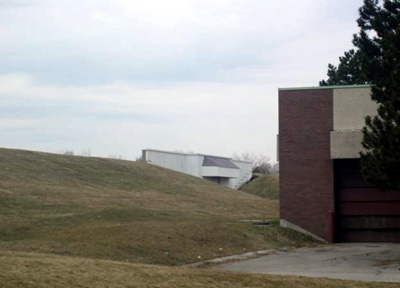
There was still no one there. It had been a cold dark spring so far, the kind of spring that tells you not to assume that summer will come again just because it has always returned in the past. From my vantage point by the wall I saw two lone figures waiting for a bus.
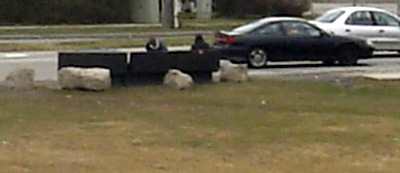
I approached them to engage in friendly conversation and see if they knew anything about the old waterworks. But my mind wasn't right and my manner betrayed that. I never got as far as querying them as to whether they knew if there had once been a Camera Obscura here.
The two men evaded me the way you do when you're with someone not fully responsible for his actions and don't want any trouble. They kept glancing nervously towards their approaching bus. And when it arrived they were pulled into it as into the vortex of a man-consuming toilet.
I walked back to what I'd now named in my imagination the Garth and Stonechurch Camera Obscura. I felt that the renovations on my house would never be done, that this open and empty place would be my sanctuary. That I would come here so regularly and for so long that time would cease to exist.
There would only be this tyranny of open spaces. And that someday, as all things seemingly eternal MUST someday change, the doors of the G&SCO would be open for me and me alone, would pull me up their serpentine road and close behind me, and I would hear the calm, quiet voice of Ernest Chappell, identical to the broadcast, except that now I've somehow replaced the waitress as another doomed character.
There isn't anybody around the camera obscura when we climb up the steps. No tourists, nobody, just me and Mark Renton?... Mark Fenton? . Whatever his name was.
The wooden door bangs behind us.
SOUND: (WOODEN DOOR BANGS SHUT)
(MUSIC ... OUT)
CY: (NARRATES) I didn't know a place could be so dark.
Well, we stood there and looked at the white-top table and the moving picture of Santa Monica?...Hamilton? wherever the place was. I have to admit it's quite a kick the first time you see it.
But I hadn't seen anything yet.
And in my daydream there is a table in the G&SCO, and when I look at it, the murdered man in Cooper's drama has merged with the Richter's image Andreas Baader dead in the Stammheim prison cell,
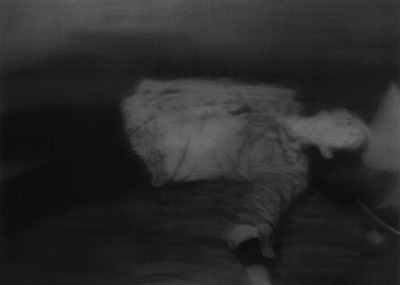
Man Shot Down 2 (Erschossener 2) 1988. Oil on Canvas 100.5 cm X 140.5 cm (Image Credit: Baader-Meinhof.com)
30 years and 4 days after the broadcast of the Quiet, Please episode. But as I said, all sense of the passing of time has evaporated for me and really, I now understand, all of the things in what we call history are identical and simultaneous. I turn and pound on the doors of the G&SCO, but they won't let me out.
OK, so I went back to the office and decided not to return to Garth and Stonechurch for a really long time, and decided that when I DID go back I'd take a friend.
I was in a much better frame of mind later that night. I was still thinking about the Quiet, Please Camera Obscura, but now I was thinking about a part early on, with Cy at a restaurant.
It's one of those moments in Noir drama, where you forget the guy is doomed, and even though you know better, you let yourself hope he still has a chance. I liked how the passage described a dining culture that doesn't exist much any more: the lunch counter, a place we know so well from period movies. Here a picture of it comes more from the dialect than the few words that describe it.
CY: (NARRATES) There was this girl that worked in Llewellyn's restaurant next door to Harry Colin's bargain store where I worked.
That morning, I went next door for a cup of what Llewellyn claims is coffee. Nobody in there but this girl, this waitress, Mary or Kate or whatever her name was. She'd been cryin'. I said, "What's the matter with ya, kid?"
I needed to be in a place like that. There wasn't one that I knew of, so I went to my favourite Tim Hortons: the one at Bay and Cannon. Sure, there are four Tim Hortons even closer to my house, but this is my favourite. The coffee isn't any different.
Maybe it's the shape of the room, Maybe it's the quality of the Southwest light through the windows at dusk, and the quality of the fluorescent light, once there isn't Southwest light any more. Maybe it's the people who come into it. Or maybe it's just because I went there a few times in a row feeling particularly good, and believe I can get that back.
Quiet, Please, Camera Obscura, episode 19, Monday 13 October 1947 had put me in the mood for Noir fiction, and I took a collection of Dashiell Hammett stories with me to sit and read them and forget about my problems with home renovation and foreign airports.
I think I like it best in late summer light, but even in cold early spring it's good. There was rain that evening. There were two older men sitting together, talking. And an older Muslim woman in a veil, and a mother and daughter with the same shade of blonde hair, who seemed to want to spend time together. Just talking quietly to each other.
But a few minutes into my stay I realized I wasn't able to read because the man sitting across from me was talking to a couple of older men he'd obviously just met there. His voice was of a quality I couldn't shut out in order to concentrate on reading. And soon enough I didn't want to anyway.
I am in the habit of carrying a slender pen and pencil in the arm of my bomber jacket. I withdrew the pen from its narrow sheath and transcribed on my napkin.
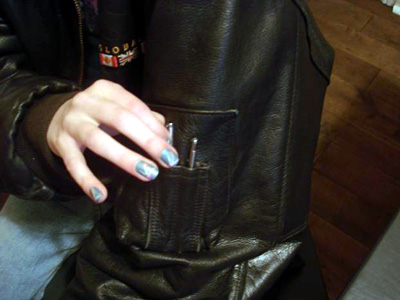
Cameras get attention and bring things to a halt. No one questions the writer. Particularly as I had the book with me. If he noticed me at all, he'd note the book I was reading first. Even amidst so diverse a rendevous of strangers I figured I was probably the most incongruous, if only by my activity and attitude - the most out of phase with the energy in the room.
He would note the Hammett; assume I was a Queer Studies professor jotting down notes on the homoerotic subtext of one of Hammett's lesser stories. But I don't think he noticed me at all. In one of his stories Hammett says something to the effect that if you're putting someone under surveillance, just stay clear of direct eye contact and they'll never make you.
Here's what I wrote down:
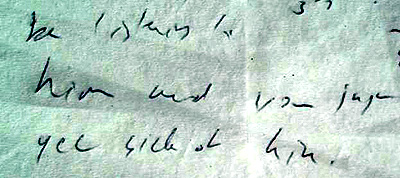
FIRST SPEAKER: It's not that I don't like Neil Peart—it's just—I don't KNOW—you'll be LISTENING to him and you just get SICK of him—I don't KNOW—they're RUSH—That's—It's just my opinion—I'm more into FOUR-piece now—I grew OUTA them—I grew OUTA them—It's like I was saying earlier—y'KNOW—I just TURNED forty- ONE—
MAN OPPOSITE: I'm 51.
FIRST SPEAKER: FORty wasn't so bad—but I'm starting to FEEL my age—But I KNOW music y'know—I KNOW music—Like WHO'S NEXT—Like THAT's a MASterpiece—when my Dad died—I don't EVEN know WHEN he died. Maybe. 2005? I don't know—Like I'm not GOOD at MATH—But I spent a lot of time with him—since—I guess about—he'd been married two years—I mean his second marriage—I don't mean my MOTHer—Like I go every DAY and like BE with him—It might have been 2004—I'm not GOOD with MATH—But I was thinking once—he was SICK so I had time to THINK—Like also—Like SABbath—People thought it was EVIL—It got called EVIL—But songs—Like WAR PIGS—Like THAT'S a masterpiece—Like Osborne—he must have had the best voice EVer—but people thought it was EVIL—so they—like—didn't even NOtice.
And I wrote until I ran out of the napkin.
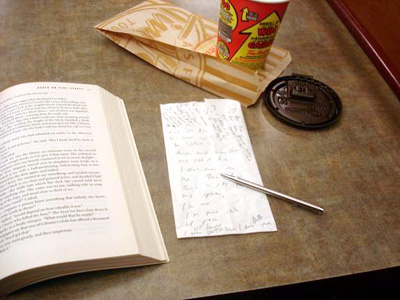
And then I stopped writing and just listened and then the voice just became pure sound—the music of the room—and I was thinking about the famous Ernest Hemmingway story, "A Clean Well Lighted Place." It's such a short story it's almost as fast to read as to describe.
The situation is simple. An older waiter and a younger waiter work in a restaurant. There is a single old man drinking there and we learn he does this night after night and won't leave until 3:00 am. We learn that the old man is deaf and has recently tried to kill himself.
The young waiter wants to go home to his wife, but the older waiter doesn't want to shut down until the old customer leaves. After the customer pays up and leaves the waiters talk.
"We are of two different kinds," the older waiter said. He was now dressed to go home. "It is not only a question of youth and confidence although those things are very beautiful. Each night I am reluctant to close up because there may be someone who needs the cafe."
"Hombre, there are bodegas open all night long."
"You do not understand. This is a clean and pleasant cafe. It is well lighted. The light is very good and also, now, there are shadows of the leaves."
The tone of the man sitting across from me didn't change. The strangers he spoke to didn't say much but still I felt, by the way they were sitting and listening, they were giving him a lot.
His conversation was the same wherever you entered it. It didn't unfold in time. He was speaking pieces of hard strong feeling and he was embedding them in background of music criticism. To make them not so hard. I have no trouble understanding a person who would do that.
I first read Hemingway's story in my teens and pretended I knew why everyone thought it was so great. But I was a lot like the young waiter in the story. What's good about the story is nothing that can be taught or analysed.
Either you can feel it or you can't. Granted, I have the worst bathroom in Canada, but even if I had a great one, I know now that a public place that's clean and well-lighted can be an awfully good thing to offer against the darkness.
By critic 1 (anonymous) | Posted May 01, 2007 at 12:04:58
To post a comment I must multiply one by five. I thus surmise this narrative is to be graded on a scale of one to five. It will pass, I'm sure, much like life itself.
Keeping pets is a growing trend in city life, perhaps as a link to our rural past. Or, perhaps this is an alternative to populating families with children. Perhaps it is a sign of society's increasing wealth, though I note that often the poorest families have the largest dogs.
Mr. Fenton's narrative reminds me that in winter many mountain residents toboggan down the banks of the water reservoir at the intersection of Stone Church and Garth Streets. They often run their dogs at the same time. In spring frozen mounds of dog waste slowly melt. Rains wash the waste through the soil to the water reservoir below.
As they grow older, more and more of my neighbours' ears have grown long and floppy.
Regretably, I have no photos to lend credence or context to these observations.
By joejoe (anonymous) | Posted May 02, 2007 at 15:51:08
Hey Mark,
There is also a Camera Obscura in Edinburgh, Scotland. It's cool. I remember a group of us snooping around the whole downtown with it. We watched a guy get out of his car and scratch his balls, completely oblivious that he was being watched... (this was a while ago now - no privacy concerns back then...).
Strange thing...right after I read your piece I picked a book up off my shelf and started reading: The Diary of Anne Frank. On the first page she starts talking about a game she got for her birthday, a, "Camera Obscura"...! Do you believe in coincidences...?
Weird...
By Den Hamphery (anonymous) | Posted April 12, 2011 at 02:12:59
Yes, this is great ..
Now in this modern world nothing is impossible ..
Tubal Ligation Reversal is very safe now ..
but remember the legacy of this operation depends on the doctor moves.so make sure that the doctor has experience in this field.
You must be logged in to comment.
There are no upcoming events right now.
Why not post one?